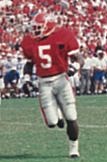 Hearst with the Georgia Bulldogs in 1991 | |||||||||||||||
| No. 23, 20 | |||||||||||||||
|---|---|---|---|---|---|---|---|---|---|---|---|---|---|---|---|
| Position | Running back | ||||||||||||||
| Personal information | |||||||||||||||
| Born | January 4, 1971 Lincolnton, Georgia, U.S. | ||||||||||||||
| Listed height | 5 ft 11 in (1.80 m) | ||||||||||||||
| Listed weight | 215 lb (98 kg) | ||||||||||||||
| Career information | |||||||||||||||
| High school | Lincoln County (Lincolnton) | ||||||||||||||
| College | Georgia (1990–1992) | ||||||||||||||
| NFL draft | 1993: 1st round, 3rd overall pick | ||||||||||||||
| Career history | |||||||||||||||
| Awards and highlights | |||||||||||||||
| |||||||||||||||
| Career NFL statistics | |||||||||||||||
| |||||||||||||||
Gerard Garrison Hearst (born January 4, 1971) is an American former professional football player who was a running back in the National Football League (NFL) for ten seasons. He played college football for the Georgia Bulldogs, and was recognized as a unanimous All-American. A first-round pick by the Arizona Cardinals, he also played professionally for the Cincinnati Bengals, San Francisco 49ers and Denver Broncos of the NFL. He ran for 1,000 yards or more in four different seasons. He was named the NFL Comeback Player of the Year in 2001.
Contents
- Early life
- College career
- College statistics
- Professional career
- Arizona Cardinals
- Cincinnati Bengals
- San Francisco 49ers
- Denver Broncos
- NFL career statistics
- Personal life
- Gay slur controversy
- See also
- References
- External links
In 1992, Hearst finished in third place in the Heisman Trophy voting after rushing for 1,547 yards and 19 touchdowns. When he left Georgia, he was the second-leading career rusher. Hearst was the number 3 overall pick in the 1993 NFL draft. He played 12 years for the NFL. [1]